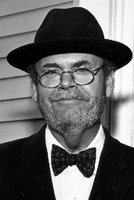Bodies in Motion and at Rest
There is nothing like the sight of a dead human body to assist the living in separating the good days from the bad ones. Of this truth I have some experience.  At a recent writing conference we had an opportunity to hear Thomas Lynch, a funeral director and writer from
At a recent writing conference we had an opportunity to hear Thomas Lynch, a funeral director and writer from
Many's the day I would awaken in gloom--a darkness left over from a dream or the night's drinking or a dread of the day I was awakening to. The moments spent before the mirror while tending to my toilet did nothing to lessen the lessons that Time is certainly not on our side, nor does it heal more wounds than it opens. The ever-retreating hairline, the whitening of one's beard and mustache, the bleeding gums, the basal cell carcinomas, the boils and blisters and bags under the eyes, the belly gone soft, the withering member, the hemorrhoids and hematomas, the varicosities and local edemas, the puff, the paunch, the wrecked version of one's former self that presents itself most mornings, are enough to render most sane men suicidal. And whilst a fresh shave, a dose of toilet water pour homme, a pressed suit, new shirt and knatty tie, added to a cup of coffee and a toasted bagel, might quicken in us the will to live, it falls well short of a joie de vivre. And many's the morning I would leave home for the long walk across the street to my office at the funeral home bearing the gloom with the round shoulders of the sluggard and poltroon, waiting for the worst to happen. It was there, in the parlors of the funeral home--my daily stations with the local lately dead--that the darkness would often give way to light. A fellow citizen outstretched in his casket, surrounded by floral tributes, waiting for the homages and obsequies, would speak to me in the silent code of the dead: "So, you think you're having a bad day?"
The gloom would lift, inexplicably. Here was one to whom the worst had happened, often in a variety of ways, and yet no word of complaint was heard from out the corpse. Nor did the world end, the sky fall, nor his or her people become blighted entirely. Life, it turns out, goes on with or without us. All is well. There is at least as much to be thankful for as wary of.
